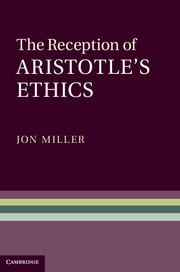Book contents
- The Reception of Aristotle's Ethics
- Contents
- Notes on contributors
- Acknowledgments
- A note on abbreviations and transliteration
- Introduction
- Chapter 1 The Nicomachean Ethics in Hellenistic philosophy
- Chapter 2 The transformation of Aristotle's ethics in Roman philosophy
- Chapter 3 Aristotelian ethics in Plotinus
- Chapter 4 St. Augustine's appropriation and transformation of Aristotelian eudaimonia
- Chapter 5 The Arabic and Islamic reception of the Nicomachean Ethics
- Chapter 6 Maimonides’ appropriation of Aristotle's ethics
- Chapter 7 The relation of prudence and synderesis to happiness in the medieval commentaries on Aristotle's ethics
- Chapter 8 Using Seneca to read Aristotle
- Chapter 9 Aristotle's Ethics in the Renaissance
- Chapter 10 The end of ends? Aristotelian themes in early modern ethics
- Chapter 11 Affective conflict and virtue
- Chapter 12 Kant and Aristotle on ethics
- Chapter 13 The fall and rise of Aristotelian ethics in Anglo-American moral philosophy
- Bibliography
- Index
Chapter 12 - Kant and Aristotle on ethics
Published online by Cambridge University Press: 05 February 2013
- The Reception of Aristotle's Ethics
- Contents
- Notes on contributors
- Acknowledgments
- A note on abbreviations and transliteration
- Introduction
- Chapter 1 The Nicomachean Ethics in Hellenistic philosophy
- Chapter 2 The transformation of Aristotle's ethics in Roman philosophy
- Chapter 3 Aristotelian ethics in Plotinus
- Chapter 4 St. Augustine's appropriation and transformation of Aristotelian eudaimonia
- Chapter 5 The Arabic and Islamic reception of the Nicomachean Ethics
- Chapter 6 Maimonides’ appropriation of Aristotle's ethics
- Chapter 7 The relation of prudence and synderesis to happiness in the medieval commentaries on Aristotle's ethics
- Chapter 8 Using Seneca to read Aristotle
- Chapter 9 Aristotle's Ethics in the Renaissance
- Chapter 10 The end of ends? Aristotelian themes in early modern ethics
- Chapter 11 Affective conflict and virtue
- Chapter 12 Kant and Aristotle on ethics
- Chapter 13 The fall and rise of Aristotelian ethics in Anglo-American moral philosophy
- Bibliography
- Index
Summary
The traditional view of the relationship between the moral theories of Aristotle and Kant is that the two were fundamentally opposed to each other. Kant not only radically rejected Aristotle's eudaimonism, but he was also opposed to virtue as a fundamental ethical category. From the Aristotelian point of view, it has been argued that Kant's formalism and rigorism, his emphasis on pure rationality and eternal or unchangeable law, leaves no room for human flourishing of the sort that Aristotle had in mind. More recently, there have been several attempts to show that the opposition between Kantian and Aristotelian moral theory is neither as radical nor as important as traditionally thought. I would like, in this essay, to try to defend important aspects of the traditional theory. There is, I will argue, a fundamental difference between Aristotelian approaches and Kant's own view. Furthermore, I will suggest that the attempts to minimize the differences give up some of the deepest aspirations of Kantian idealism.
This is not to deny that the Aristotle–Kant relation is sufficiently complex to make it impossible to do complete justice to it in a relatively short essay like this one. I will therefore limit myself to two of the themes that I consider most important. These are Kant's view of the problem of eudaimonism and egoism and its relation to Aristotle; and the similarities and differences between Aristotle's and Kant's virtues. To this end, I first analyze Kant's explicit statements about Aristotelian ethics and show that Kant, at the very least, did not consider himself as an Aristotelian, but thought that he had provided a radical alternative to it (section iii). Secondly, I discuss some of the attempts to make Kant's moral theory compatible with eudaimonsim of some sort (section iv). Thirdly (section v), I attempt to disentangle Kant's various statements about virtue and attempt to situate his moral thought more precisely within the tradition of the history of virtue ethics. This is followed by a short evaluation of what I take to be the significance of my findings.
- Type
- Chapter
- Information
- The Reception of Aristotle's Ethics , pp. 244 - 261Publisher: Cambridge University PressPrint publication year: 2012

